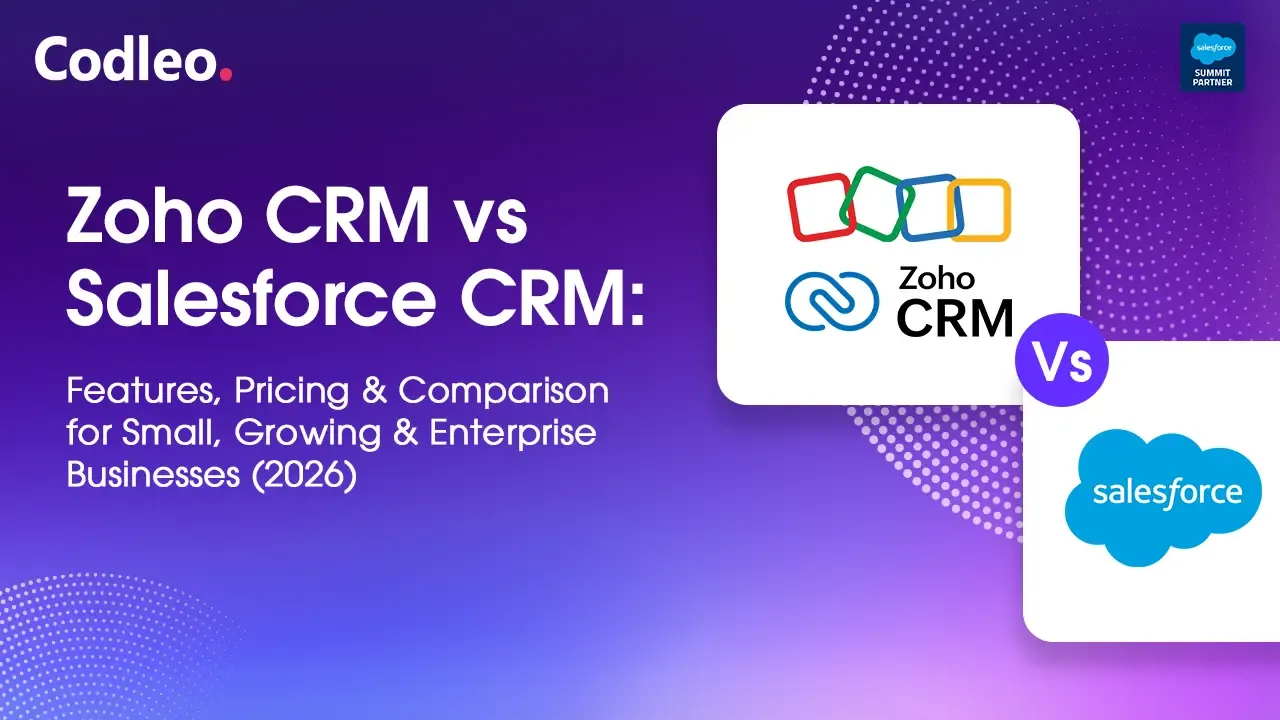
SALESFORCE SERVICE CLOUD: EVERYTHING YOU NEED TO KNOW ABOUT

In today's demanding landscape, customer service requires advanced solutions for seamless interactions and personalized experiences. Businesses need to adopt innovative tools like Salesforce Service Cloud to stay ahead. Salesforce Service Cloud is an award-winning platform that helps organizations provide top-notch support to clients. To fully leverage its capabilities, companies are increasingly turning to Salesforce development services to customize it to their specific needs.
Salesforce Service Cloud is a game-changer in customer service, transforming how businesses connect with their customers. Developed by Salesforce, a leader in CRM technology, Service Cloud offers a comprehensive set of tools for delivering exceptional support across various channels, including email, phone, social media, and live chat. This multi-channel approach helps companies build stronger customer relationships and enhance brand loyalty.
While the standard features of Salesforce Service Cloud are impressive, its true value lies in its customization options. This is where Salesforce development services come in. Certified Salesforce developers and Salesforce consultants help businesses tailor Service Cloud to their unique workflows, industry needs, and customer service processes.
With expert Salesforce development services, companies can create custom solutions that align with their vision and goals. This includes integrating Service Cloud with existing systems, customizing workflows, using AI-powered tools like bots for automation, and developing self-service portals to boost customer engagement. The result is a powerful ecosystem that empowers support agents, delights customers and drives overall business success.
Understanding the Role of Customer Service in Business
Outstanding customer service is crucial to business success, playing a key role in building reputation, retaining customers, and driving growth. In a competitive global economy where products and services are often similar, exceptional customer service sets a business apart.
Deliver Positive Customer Experiences
Customer service connects businesses and customers, leaving a lasting impression with every interaction. Positive experiences not only boost customer satisfaction but also foster brand loyalty. When customers feel valued and supported, they are more likely to return and recommend your brand to others.
Foster Strong Customer Relationships
Customer service should go beyond resolving immediate issues to build strong, lasting relationships. By understanding customer preferences and pain points, businesses can tailor their offerings. Engaged and loyal customers are more forgiving of occasional mistakes, trusting that issues will be resolved quickly and empathetically.
Retain Customers and Reduce Churn
Keeping existing customers is often more cost-effective than acquiring new ones. Superior customer service is key to effective customer retention, making customers feel valued and appreciated. This reduces the likelihood of them switching to competitors, ensuring steady revenue and creating opportunities for cross-selling and upselling.
Generate Growth and Profits
Satisfied customers are more likely to become repeat buyers, boosting a business’s bottom line. They also provide valuable feedback that can reveal new product opportunities and market demands. Using this feedback to improve products and services can lead to growth and increased profits.
Enhance Brand Reputation and Word-of-Mouth Marketing
A company’s brand reputation is heavily influenced by customer experiences. Exceptional customer service generates positive word-of-mouth, attracting new clients through personal recommendations. Conversely, poor service can harm brand's reputation and lead to negative reviews that are difficult to overcome.
Gain a Competitive Edge
In markets where products and prices are similar, customer service can be the differentiator. Companies that prioritize excellent customer service gain a competitive edge, attracting customers who value an exceptional experience beyond just the product or service.
Address Issues and Mitigate Crises
Every business faces problems or crises at some point. How these are handled defines the organization. Prompt, empathetic customer service during difficult times is crucial to maintaining customer trust and loyalty. Businesses that show care and commitment to finding solutions emerge stronger and more resilient.
By focusing on outstanding customer service, businesses can build lasting relationships, enhance their reputation, and drive sustained growth and profitability.
Key Features and Capabilities of Salesforce Service Cloud
Salesforce Service Cloud is a robust customer service platform designed to enable businesses to provide superior customer support experiences. Packed with many features and capabilities, Service Cloud provides businesses with an effective tool for handling customer inquiries quickly while streamlining operations smoothly and creating lasting customer relationships.
360-Degree Customer View
Service Cloud equips agents with an in-depth view of each customer, consolidating all pertinent data in one central place. From past interactions and purchase history to open cases and customer preferences, Service Cloud gives its agents access to this comprehensive view that helps them fully comprehend every inquiry and respond with tailored support, creating more meaningful interactions between agents and their customers.
Case Management
Case management is at the core of Service Cloud's capabilities, allowing agents to efficiently log, track, and resolve customer issues through its ticketing system. Cases may then be prioritized according to agent or team availability for timely resolution as needed; additionally, Service Cloud facilitates automated case routing, where inquiries can be routed automatically toward agents based on predefined criteria.
AI-Powered Automation
Service Cloud uses artificial intelligence through Salesforce Einstein for intelligent automation capabilities, providing features like Einstein Bots that automate routine customer inquiries while freeing agents to focus on more complex interactions that add greater value. Furthermore, Einstein's predictive analytics enables businesses to identify service issues before they occur, allowing proactive management of customer needs and reducing customer support expenses.
Self-Service Portals
Empowering customers to find answers themselves is at the heart of modern customer service, and Service Cloud enables businesses to develop self-service portals, knowledge bases, and community forums so their customers can find useful information independently and resolve common queries independently. By offering these options, companies can significantly decrease support requests while improving customer satisfaction levels and increasing overall efficiency.
Service Analytics and Reporting
Leveraging analytics-driven insights is vital in optimizing customer service operations, and Service Cloud offers various analytics and reporting tools that allow businesses to track key performance indicators (KPIs), measure agent productivity, identify customer trends and trends in inquiries, as well as use this data for continuous service improvement strategies or identify areas needing improvement.
Field Service Management
Service Cloud offers businesses that engage in field service operations robust field service management capabilities to optimize the efficiency of field agent dispatching and location tracking in real-time, equipping agents with mobile tools for accessing customer data on-site, resulting in seamless customer experiences and increasing field service operations.
Integration with Other Salesforce Products
Service Cloud is part of Salesforce's larger ecosystem and works perfectly in unison with other products like Sales and Marketing Cloud, providing sales teams and service personnel a streamlined customer engagement solution across touchpoints. This integration also supports improved team collaboration for improved customer experiences across touchpoints.
How Salesforce Service Cloud Streamlines Customer Support?
In today's fast-paced business world, efficient and seamless customer support is essential for success. Salesforce Service Cloud, a leading customer support platform, has transformed how companies manage and organize their support operations. Its tools and features not only enhance agent productivity but also foster lasting customer relationships.
Omni-Channel Interaction Management
Salesforce Service Cloud simplifies customer support with its omnichannel capabilities. It allows businesses to manage customer interactions from various channels—such as email, phone, live chat, social media, and self-service portals—from a single, centralized platform. This eliminates the need for agents to switch between different systems, creating a streamlined experience for both support teams and customers.
Comprehensive Customer Data and 360-Degree View
Service Cloud provides a detailed view of each customer by consolidating all relevant data—past interactions, purchase history, previous cases, and preferences—into one place. This comprehensive customer data equips agents to understand customer needs and provide personalized, contextualized support.
Intelligent Case Management and Automation
With the help of expert Salesforce Service Cloud consultants, businesses can efficiently manage customer inquiries using intelligent case management. Cases can be automatically assigned, prioritized, and routed to the right agents based on predefined criteria. Salesforce Einstein powers intelligent automation of routine tasks, freeing up agents to handle more complex interactions that add greater value.
Self-Service Portals and Knowledge Bases
Service Cloud empowers customers with self-service portals and knowledge bases to find answers on their own, reducing the need for support requests and improving customer satisfaction. By providing access to FAQs, helpful articles, and community forums, customers can resolve common issues independently, allowing support agents to focus on more complex matters.
Service Analytics and Reporting
Data-driven insights are crucial for optimizing customer support operations. Service Cloud offers powerful analytics and reporting tools that enable businesses to monitor key performance indicators (KPIs), track agent productivity, and identify trends in customer inquiries. This information helps organizations continuously improve their support strategies and pinpoint areas needing enhancement.
Case Collaboration and Escalation
Service Cloud facilitates effective collaboration among support agents and teams. Agents can work together in real time on cases, share insights, and seek assistance when needed. The platform also supports easy case escalation to higher tiers or specialized teams, ensuring complex issues are resolved promptly and effectively.
Integration with Other Salesforce Products
Service Cloud integrates seamlessly with other Salesforce products, such as Sales Cloud and Marketing Cloud, providing a holistic approach to customer engagement. This integration enables sales, marketing, and service teams to work together, creating a consistent and exceptional customer experience across all touchpoints.
Field Service Management
For businesses involved in field service operations, Service Cloud offers valuable field service management features. Companies can efficiently schedule and dispatch field service agents, track their locations in real-time, and equip them with mobile tools to access customer data on-site. This streamlines field operations and ensures excellent customer experiences.
By leveraging Salesforce Service Cloud, businesses can transform their customer support operations, enhancing efficiency, customer satisfaction, and overall success.
Exploring the Benefits of Using Salesforce Service Cloud
Salesforce Service Cloud, an advanced customer support and engagement platform, has revolutionized business customer support. From streamlining processes to enhancing client experiences and delivering superior support, Service Cloud’s innovative capabilities help organizations meet customer needs efficiently while boosting business productivity.
Improved Customer Experience
One of the standout features of Salesforce Service Cloud is its ability to provide an exceptional customer experience. By supporting multiple channels—email, phone, live chat, social media, and self-service portals—customers can interact with businesses through their preferred methods. This omnichannel approach ensures customers can reach out in the way that suits them best. Agents have access to relevant customer information, allowing them to offer personalized and context-rich support, which increases customer satisfaction and brand loyalty.
Increased Agent Productivity
Service Cloud streamlines customer support operations, enabling agents to work more effectively. By automating routine tasks and routing inquiries to the appropriate agents, the platform frees up agents to handle more complex interactions. AI chatbots, like Einstein Bots, manage routine inquiries, allowing agents to focus on higher-value tasks. This leads to higher case volumes being handled and faster resolution times.
AI-Driven Automation and Insights
Salesforce Service Cloud’s AI capabilities, such as Salesforce Einstein, allow businesses to automate repetitive tasks and gather valuable insights into customer needs. AI analytics provide critical intelligence on customer service performance, agent efficiency, and trends in customer inquiries. This data helps organizations make informed decisions to optimize their support strategies.
Scalability and Flexibility
Service Cloud is designed to meet the evolving needs of businesses of all sizes, scaling support operations as the customer base grows. Regular updates from Salesforce ensure that organizations have access to the latest features and functionalities, keeping customer service operations up-to-date.
Seamless Integration with Other Salesforce Products
As part of the Salesforce ecosystem, Service Cloud integrates seamlessly with Sales Cloud and Marketing Cloud. This integration enables sales, marketing, and service teams to collaborate effectively, providing a unified customer journey across all touchpoints. Data sharing between teams offers a comprehensive view of customer interactions, enhancing decision-making and insights.
Field Service Management
Service Cloud’s field service management features offer valuable tools for businesses with field operations. Companies can efficiently schedule, dispatch, and track field agents, equipping them with mobile tools to access customer data on-site. This ensures timely service delivery and enhances the overall customer experience.
By leveraging Salesforce Service Cloud, businesses can transform their customer support operations, improving efficiency, customer satisfaction, and overall success.
Integrating Salesforce Service Cloud with Other Salesforce Products
The power of Salesforce Service Cloud is amplified when integrated with other products within the Salesforce ecosystem. By combining Service Cloud with Sales Cloud, Marketing Cloud, and other offerings, businesses can create a cohesive customer engagement strategy that leverages shared data across teams and enhances the customer service experience.
Unified Customer Data and 360-Degree View
Integrating Service Cloud with other Salesforce products allows for centralized customer data management. This integration provides a 360-degree view of the customer, giving sales teams access to support history, marketing teams insights into customer preferences, and service agents an overview of sales interactions. With this comprehensive view, all customer-facing teams can engage in personalized and context-rich interactions.
Intelligent Case Escalation and Routing
Connecting Service Cloud with Sales Cloud enables businesses to optimize case escalation and routing. If a support case involves high-value customers or potential sales opportunities, the integration ensures these cases are automatically escalated to the appropriate sales representative. This guarantees that priority customers receive the attention they need, enhancing customer satisfaction and driving conversions.
Automated Support Tickets from Sales Interactions
The integration between Service Cloud and Sales Cloud can automate the creation of support tickets based on sales interactions. For example, if a sales representative identifies a potential customer issue during a call, a support ticket is automatically generated. This proactive approach ensures that customer concerns are promptly addressed, preventing issues from being overlooked and improving overall service efficiency.
Improved Marketing and Sales Insights
By integrating Service Cloud with Marketing Cloud and Sales Cloud, businesses can provide their marketing and sales teams with enhanced insights into customer behavior and preferences. This data allows marketers to craft more targeted campaigns and sales teams to anticipate customer needs more accurately, resulting in more tailored and effective interactions.
Holistic Customer Engagement
Integrating Salesforce products enables businesses to implement a holistic customer engagement strategy. The combined features of Service Cloud, Sales Cloud, and Marketing Cloud allow for consistent and seamless experiences throughout the customer journey. From browsing websites and engaging with marketing content to seeking support, customers benefit from a unified experience that builds satisfaction and loyalty.
By leveraging the combined strengths of Salesforce Service Cloud and other Salesforce products, businesses can enhance their customer engagement strategies, resulting in improved efficiency, customer satisfaction, and overall business success.
Tailoring Salesforce Service Cloud to Your Business Needs
Salesforce Service Cloud is a flexible customer service platform with many customizable features to meet the unique needs of any organization or industry. While it comes with many standard features out-of-the-box, its adaptability and configurability make it ideal for businesses of all sizes and sectors.
Customizing Fields and Data Model
Salesforce Service Cloud allows you to create custom fields and objects to store specific customer information relevant to your industry or business processes. Whether you need additional customer attributes, service categories, or case classifications, custom fields help you capture and analyze crucial operational data.
Custom Workflows and Processes
Custom workflows and processes streamline customer support operations and ensure consistency in case handling. With tailored workflow rules, custom escalation procedures, and automatic case assignment based on specific criteria, you can optimize case resolution times and enhance agent productivity.
Utilizing Custom Reports and Dashboards
Service Cloud's reporting and dashboard capabilities offer valuable insights into customer service performance. Customize reports and dashboards to align with your business goals, whether measuring customer satisfaction, agent productivity, or response times. These tools help present data in a way that supports your success.
Integrating Existing Systems
To maximize the benefits of Salesforce Service Cloud, integrate it with your existing systems and applications. Seamless integration ensures smooth data flow across different systems, eliminating the need for duplicate data entry. Whether connecting to CRM systems, ERP platforms, or third-party support tools, integration is key to meeting your business needs.
Implementing AI and Automation
Salesforce Service Cloud offers AI features like Einstein Bots and AI-powered case routing, which can be customized to meet your customer service objectives. Implementing these technologies reduces manual effort, speeds up response times, and enhances overall customer experiences. You can tailor AI models to fit your business language and specific customer service requirements.
Training and Onboarding
For a successful deployment of Salesforce Service Cloud, invest in comprehensive training and onboarding for your support team. Well-trained agents can fully utilize customized features and capabilities, leading to increased productivity and superior customer experiences.
By tailoring Salesforce Service Cloud to your specific business needs, you can enhance your customer service operations, improve efficiency, and deliver exceptional support experiences.
Best Practices for Implementing Salesforce Service Cloud
Implementing Salesforce Service Cloud can revolutionize your customer service operations and enhance the customer experience. To ensure a successful deployment and maximize its benefits, it’s crucial to follow best practices that align the Service Cloud with your business goals and processes.
Define Clear Objectives and Requirements
Before starting your implementation, clearly define your customer service objectives and requirements. Gather input from stakeholders across various departments to understand their needs and pain points. Set measurable goals and key performance indicators (KPIs) to track the success of your implementation. A clear vision will guide the customization and configuration process.
Conduct Rigorous Planning and Design
Proper planning and design are essential for a successful Service Cloud deployment. Map out your service processes and create a solution tailored to your unique business needs. This includes defining customer journey maps, case management workflows, agent assignment rules, and necessary integrations. Involve key stakeholders to ensure the solution meets their expectations.
Tailor Service Cloud to Fit Your Existing Processes
Service Cloud’s flexibility allows you to customize it to fit your existing business processes. Create custom objects, fields, and page layouts that capture customer data and support information specific to your operations. This customization ensures that your agents work efficiently and deliver positive customer interactions.
Prioritize Proper Data Migration and Integration
Data migration and integration are critical components of implementing Service Cloud. Ensure that your existing customer information is accurate, complete, and relevant before migrating it to the new platform. Proper migration preserves historical records and forms the foundation for future customer interactions. Integrate Service Cloud with other platforms like CRMs or ERP systems for seamless information flow and a comprehensive view of customer details.
Address User Adoption and Training
User adoption is key to the success of any new system. Invest in thorough training sessions for your customer service agents and other users interacting with Service Cloud. Training should cover essential functions, workflows, and best practices. Encourage feedback to address any concerns or challenges, ensuring a smooth transition and positive user experience.
Leverage AI and Automation
Salesforce Service Cloud offers AI features like Einstein Bots and intelligent case routing to streamline customer support operations. Utilize these AI tools to automate routine tasks, speed up response times, and increase agent productivity. This allows your customer service team to focus on higher-value interactions, enhancing overall efficiency and customer satisfaction.
Evaluate Performance and Measure Success
Establish KPIs to measure the success of your Service Cloud implementation and regularly assess your progress. Monitor customer feedback, agent productivity, and response times to evaluate the impact on your customer service operations. Use this data-driven insight for strategic decision-making and continuously optimize the platform for the best results.
By following these best practices, you can ensure a smooth and successful implementation of Salesforce Service Cloud, leading to improved customer service operations and enhanced customer experiences.
The Key Takeaway
Salesforce Service Cloud is a powerful customer service platform offering numerous benefits for businesses across various industries. It has revolutionized customer care by enhancing customer experiences, streamlining support operations, boosting agent productivity, and fostering lasting customer relationships.
Comprehensive Customer Engagement Strategy
When integrated with other Salesforce products, Service Cloud enables businesses to develop a comprehensive customer engagement strategy that spans sales, marketing, and support. This integration leverages data insights to create personalized and context-rich interactions at every customer touchpoint, enhancing customer loyalty and advocacy, and driving business success.
Customizable Features for Maximum Benefit
Service Cloud’s flexible features and customization options allow businesses to tailor the platform to their specific needs. Custom workflows, automation, and detailed reporting help optimize support processes and provide valuable analytics that support strategic decision-making.
Successful Implementation
Implementing Service Cloud requires careful planning, thorough user training, and efficient data migration. By focusing on user adoption and gradually introducing the platform, businesses can ensure a successful and long-term deployment of Service Cloud.
In summary, Salesforce Service Cloud stands out as a robust solution for improving customer service operations, driving efficiency, and building strong customer relationships. By leveraging its capabilities and integrating it with other Salesforce products, businesses can create a seamless and effective customer engagement strategy.
Latest Blog
Say "hello" to us and lets gets talking
Partner with the best team in the world for your CRM or other digital needs.
Contact Us




